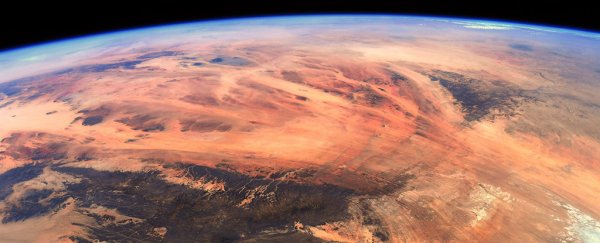The Red Planet, called that for its rusty oxidized soil, looks vastly different to our planet's green and blue appearance.
Well, at least usually. The two planets can also appear incredibly similar, as European Space Agency astronaut Thomas Pesquet discovered while taking a photo of Earth looking decidedly red earlier this month, while onboard the International Space Station.
"No cloud in sight and the red and ochre colors stretching to the horizon," he wrote about the surreal scene.
"I thought I was orbiting Mars when I saw this view!"
 (ESA/NASA–T. Pesquet)
(ESA/NASA–T. Pesquet)
There's a simple explanation for this cosmic mix-up – we're looking at the equally red soil of a desert.
Unfortunately, Pesquet doesn't let us know which one, however looking at the dark mountain ranges we think it could be the Tibesti Mountains – located in Chad and Libya in northern Africa.

These mountains are part of the Sahara, a desert which takes up 31 percent of the whole continent of Africa, and which is well known for its beautiful orange sand.
However, if you were asked the question, 'Is this photo Earth or Mars?' and you weren't up to scratch on your Saharan geography, there's another feature that gives it away.
Earth's atmosphere is a beautiful vivid blue – much more blue than the thin atmosphere of Mars, and Pesquet's image displays Earth's signature blue smear enveloping the red soils.
 Mars' thin atmosphere. (ESA/DLR/FU Berlin/J. Cowart/CC BY-SA 3.0 IGO)
Mars' thin atmosphere. (ESA/DLR/FU Berlin/J. Cowart/CC BY-SA 3.0 IGO)
Even so, the image serves as a reminder that despite the 225 million kilometers (140 million miles) on average between Earth and Mars, sometimes these two worlds are more similar than we think.
Just two friendly planets, spiraling through the unknown Universe.
